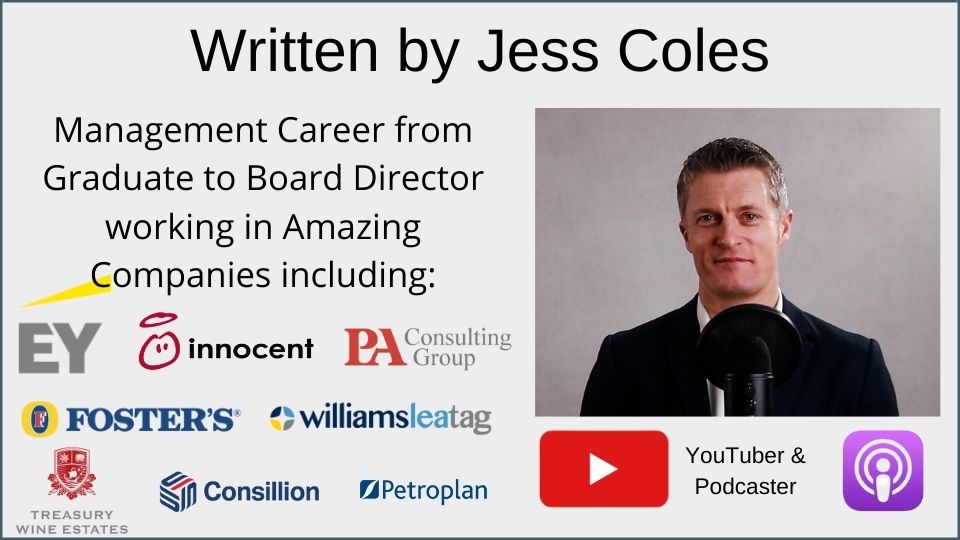Work Smarter Before Working Harder to Get Ahead at Work – 5 Ways to Create Lots More Value

Work smarter before working harder is common sense. Too many people are working really hard on tasks, activities and projects that don’t produce much value in their boss’ eyes and therefore they don’t get ahead at work very quickly. For example, these people get caught up doing a lot of urgent but not important tasks.
How do I work smarter is a question we often ask ourselves.
Any professional and manager of a team has lots of opportunity to work smarter before working harder. To get ahead at work, delivering as much value as possible to the business is a must.
Use these 5 approaches to identify the most valuable areas of your job and put more effort into these areas.
Work Smarter Before Working Harder to Get Ahead at Work
- What does working smarter mean
- Is working smarter possible in my role?
- Why working smarter before working harder is needed
How do I work smarter
- Target the bigger picture
- Maximise automation
- Work to leverage your team’s efforts
- Focus on results rather than activity
- Aim to deliver 8 commercial benefits
Watch on YouTube
Listen on Podcast
what does working smart mean
Working smart is simply creating more value for the business in the same time worked or effort taken. For example, improve how you produce a set of reports and produce 5 reports in the same time as it used to take to produce 3 reports. Another example – reducing the cost of producing a widget without any other factors changing. A final example – converting a set number of enquiries into higher level of sales. These all increase the value produced without spending more or taking more time and are examples of working smarter.
Working harder would be to work longer to produce the 5 reports or sell the widget at a lower price and lower profit to keep market share or to spend more on advertising to get the enough leads to win the same level of sales.
If businesses don’t constantly look to make improvements to how they serve their customers or the cost of serving their customers, their competitors will overtake them. Don’t improve for long enough and there won’t be a business left. Help your business be successful by looking for improvements in everything you do.
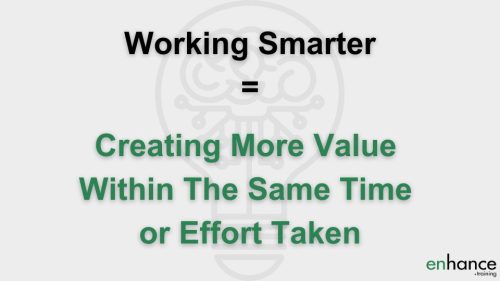
Is working smarter possible in my role
This is a good question. Any job that involves regular problem solving the answer is an easy yes. Most professional roles and all management roles fall into this category.
For those that do more routine repetitive tasks as part of their job, then working smarter might be harder to achieve, yet there will still be opportunities. Every job should have opportunities to save time. Saving time by changing how you do a task is an improvement and therefore working smarter.
Look for the opportunities in your role and act when you find them.
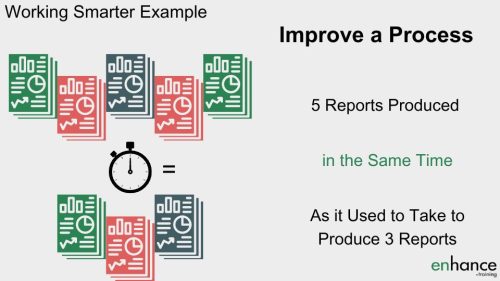
Why working smarter before working harder is needed
To be successful at work. To be given more interesting tasks, more responsibility, more autonomy, to be regularly promoted or progress your career – you can’t avoid working hard. I have not met any successful people that have not worked hard. Working smarter not harder is the dream, work smarter AND work hard is the reality of being successful.
I have met a lot people that worked very hard but progressed their careers slowly. Working hard is not enough on its own to gain success and promotion at work.
Working smarter before working harder is about finding what is valuable to work on and then do more of what’s valuable to the company, rather than just working harder on everything.
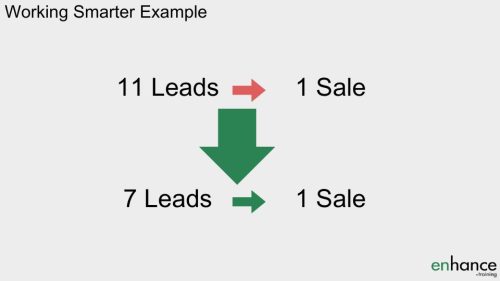
How do I work smarter
I have 5 key approaches to identify the most valuable areas in your job. Use these and focus more of your efforts in the high value areas. When you have urgent requests and problems coming in from all directions, it can be hard to focus on the most important valuable work. Do your best to carve out time to work on the most important areas rather than the most urgent.
The first way to work smarter is Target the bigger picture
One of the better ways to work on what is really valuable to the business is to understand the current business goals and how these fit into the longer-term strategy. Understand how your business unit, function, team and finally your personal role can help reach those business goals.
Formal goals are usually what the company thinks are the highest value activities. The more you can focus your energy, time and work on helping achieving those formal goals, the more likely you will be doing high value work.
Work with your boss to create more time and energy working on the higher value areas of your role aligned within the bigger picture. Help yourself and help the team create the most value for the business as possible.

The second way to work smarter is to Maximise automation
Automation can be very small – like automating tasks within a spreadsheet or using systems to send out information automatically, through to using systems or robotics to replace parts of or full roles done by people.
Whenever you can use automation to
- increase accuracy or
- speed of doing a task, or
- reduce the cost of doing a task,
take it. Each of these outcomes adds additional value to the company.
Automation works very well in stable environments or replacing repetitive tasks that don’t change very quickly. Automation doesn’t work as well in fast changing environments or where tasks keep changing.
Always look out for opportunities to use automation. Do check the business benefits before investing in automation.
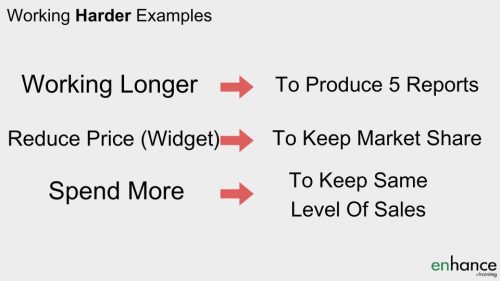
The third way to work smarter is to leverage your team’s efforts
Managers are in a brilliant place to work smartly. Managers are solving problems all day long – it is a key part of the job.
Examples of working smarter before working harder are
- spotting problems that when removed will help the whole team save time and effort or
- Challenging the status quo to remove redundant tasks, outdated tasks or low value tasks, freeing up more time for the team spend on higher value tasks
- Saying no – to you or the team – doing lower value tasks than are currently being worked on
- Getting agreement from your boss or the leadership team to focus more of the team’s time on higher value tasks
The more you can do as a manager to leverage the time and efforts of your team so they can create more value for the business, the better off you, your team and the business will be.
focus on results rather than activity – the fourth way to create more value
Undertaking activity is only really valuable if it creates desired results for the team and business. When you are focused on goals and results, research shows you are at least 20% more likely to achieve the results.
To get a team focusing on results I would suggest that:
- You create specific goals for the results you want, ideally with your team
- Explain why these are important and how they fit into the wider goals of the business
- Measure and share the progress against these goals – i.e. create visibility of progress
- Keep your focus publicly and obviously on the goals agreed and your team will have constant reminders that the goals are important to you and thus important to them
Goals and results provide much clearer direction and the ability to measure progress. Use goals and results to focus the team on higher value areas.
The fifth way to work smarter is to aim to deliver 8 Commercial benefits
All the work you focus on, and you get your team to focus on, should be creating one of these outcomes or benefits for the company:
- Increased Revenue
- Saved Costs
- Saved Time
- Improved Processes
- Increased Efficiency,
- Reduced risk
- Achieving business targets
- Pleasing customers
These benefits are what all businesses need and the more work you can do to achieve these benefits, the more value you will create. Prioritise the opportunity to create the biggest impact to one or more of these benefits and complete this first. Only them move the next opportunity on your prioritised list.
I have found one of the best ways of finding great opportunities is asking a lot of questions and listening to what team members tell me. The best opportunities are rarely obvious – if they were they would have been taken already.
Keep in mind these 8 commercial benefits and keep asking yourself how does what you are working on achieves one or more of these.
in summary
Work smarter before working harder to get ahead at work is a must. From my experience, you have to work hard to have a successful career whatever your current role and ambitions are.
Working hard alone is not enough either. In my view, working smart and working hard is the starting point for longer term career success.
The 5 critical approaches to consistently work smarter are:
- Target the bigger picture
- Maximise automation
- Work to leverage your team’s efforts
- Focus on results rather than activity
- Aim to deliver 8 commercial benefits
Ask your team to look out for any opportunities to work smarter. Keep yourself and your team focused on the higher value tasks, activities and projects rather than the urgent ones.
I have seem way too many people work really hard and not get much reward for doing so. Working hard is not enough to progress your career at any pace. Working smarter before working harder is a must in my view.
Focus on identifying the higher value tasks of your job and work hard on these. Try to avoid or put enough effort only into the lower value tasks, activities and projects. Creating more and more value is a must if you want to get ahead at work; to keep being promoted and moving your career forward


